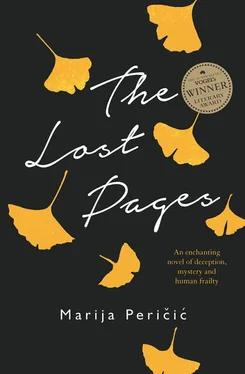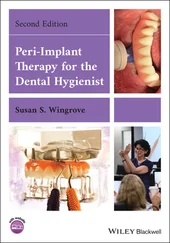I strove for total silence, so that I could surprise Franz. I had no clear idea what I was expecting to happen when he turned and found me there in the room with him. The writing table was opposite the door, under the window, so that even if I had succeeded in surprising him all that would have been visible to me would have been the back of his head and his body hunched over the table.
But, in any case, I never succeeded. Even on the occasions when the metal hinges slid over themselves as silently as the wings of a moth, some movement in the air or a change in temperature alerted him to my presence, and the slit of the door would always widen to reveal him turned in his chair, facing me.
By the time I had stepped into the room he had always slid his papers away and there was no hope of catching even a glimpse of them.
On occasion, usually when I lay awake in my bed at night, the idea would come to me that I could simply take advantage of his absence from the room—when he was washing in the morning, for example—and read through his papers then. But somehow I did not have the heart for this. The image of myself actively hunting through his papers seemed cheap and sad, like one thief stealing from another. I also feared being caught. I had many opportunities to consider it; more and more often it happened that when I returned to the room in the evening I would find him absent. I would stand outside the door and still my breath, straining my ears for the sound of his pen, the creak of his chair as he shifted his weight, but there would be only a rustling silence. The door would be locked and when I had opened it the room empty. Now, I would think, my heart racing. Now.
But I would hesitate. He could come through that door at any moment. On some days he would arrive back at the hotel much later, after I had eaten and undressed for bed; on others he would arrive a moment after me. He never explained where he had been, and I could not ask him.
One day I returned later than usual and found that he was not there. I added my sightseeing notes to the pile on the writing table and casually shuffled through it, as though I were being watched. The hotel was very quiet and I could hear a nightjar call. I stood with one eye on the door, ready to leap away the moment I heard a sound. I looked through the heap of papers, but they were all mine. The ones at the bottom of the pile were already gathering dust.
I rifled through the drawers of the little writing table. I looked around the room for likely places for him to stow his papers; in such a small room there were not many. I stooped to look under his bed. I shifted his pillow and looked underneath. I hunted through the wardrobe. His suitcase was with mine in a storeroom of the hotel, and I wondered how likely it was that he would venture there twice a day to take out his papers and then lock them in again. The wastepaper basket was full of crumpled pages. I took out a compact ball at random and opened it out.
The familiar sweep of Anja’s writing covered the page. My skin hardened and my heart was a sharp object in my chest. It was a letter, not the first page, and contained a detailed analysis of some poem or section of prose. Anja was in rhapsodies about it, and the cadences of her voice rang painfully in my head as I read the words she had written. I imaged her small hand holding the pen and guiding it to form the letters that stood there against the paper.
I immediately upended the wastepaper basket and began smoothing out all the pages it contained. Among them were many empty sheets, some containing a few words written by Franz, mostly columns of figures being added or subtracted, or what appeared to be lists of food eaten throughout the day, but there was nothing more of Anja’s. I searched through each sheet again to make sure. I read the page of the letter and read it again and then put it in my pocket. I did not know what it meant. I stood in the room, aware of the walls around me, enclosing me. Then I went out into the gardens.
The smell of the springs, to which I had become largely accustomed over the past weeks and rarely noticed now, was extremely strong that night and as noxious as a poisonous gas. I breathed it in with difficulty and could feel the odour penetrate into the fabric of my clothing and the strands of my hair. I walked around in the stench for as long as I could bear it, with one hand in my pocket, the fingers pushed into the folds of the letter, a paper pocket inside the cloth one. Naturally the letter was meant for me; it was the reply I had been waiting weeks for. I thought of Franz coming into the room every day with piles of letters addressed to him, from Klopstock, from the plump lady in the dining room, from any number of strangers.
‘Nothing for you,’ he would say, and laugh. And I would laugh, right through the stab of pain brought by Anja’s silence.
Had he discarded my letter by mistake? Or did he stand there in the hall and sort out her letters to me and put them in his pocket, smiling to himself, leering, or with a mechanical gesture, blank-eyed? Had she been writing all this time? Did he read them? I took the page out again to look for a date, but there was none.
I made up my mind to ask him about it. I had every right to ask him. Unable to wait a moment more, I hurried back to our room. I was shaking and out of breath when I reached the staircase. As I came up the stairs, I knew that the room would be dark and empty, and so it was. I took out the letter and, gripping it like a talisman, settled myself in the chair to wait for him to appear.
I had only been sitting for a short time when I heard the creak of the top stair and the sound of the door handle squeaking as it opened. Franz looked at me without greeting me. I unfolded the letter, smoothed it with my palm onto the surface of the writing table. He watched me, still standing in the doorway with the door open and his hand on the handle. Neither of us spoke. Earlier, out in the garden, I had felt ready to shout and rage at him, but now something made me hesitate. His face was blank, but held a look of slyness, of mastery. Once again, his handsomeness came into focus for me. Seeing him every day for the past weeks had habituated me to it somewhat, and made me forget it, but now I could hardly see him for all his beauty. It struck me then that I had been mistaken. The letter from Anja was not my letter—of course not. It was his.
I pictured myself sitting on trains and park benches writing to Anja, while at the same moment he sat here, in the same chair in which I now sat, and wrote too. I saw our letters being collected in tandem by the postman, and being processed and delivered together also; twins, arriving in her letterbox at the same moment. The thought made me sick. I slid the still-crumpled page of the letter into the pile of notes in front of me.
‘Still awake,’ he said; an observation. He had come into the room, hung up his hat and was taking off his jacket. I could not speak. My guts roiled, I feared my veins could not contain the sharp surges of blood sent from my heart, the edges of the room turned black. I nodded. Yes. Still awake. Then I undressed and lay in my bed, with the darkness pressing in on my opened eyes.
Morning came and I pretended to sleep while Franz rose early and left the room. After he had gone I slept a little, and as soon as I woke I took the letter out from under the pile of papers and read it again. I no longer knew where I stood in relation to Anja. I thought again and again of the last times I had seen her, but I could not understand it: the kiss, and then her rain-soaked face on the stairs. I had to keep on arranging the facts in a row in my mind, but I could not hold them there long enough to evaluate them, to discover their meaning.
I abandoned my plans for the day, washed and dressed and then went to the hotel desk to ask for the morning’s letters for our room. My hands were shaking as I shuffled through them. I did not recognise Anja’s writing on any of the envelopes, but one of the letters was addressed to me. I turned it over and saw that it was from Theodor. Of course he would be expecting a draft of our travelogue by now, and all we had was my dusty pile of notes. I cursed under my breath as I remembered the agreement I had signed. Back in our room, I opened each letter one by one, Theodor’s also. I crumpled the pages without reading them and threw them into the wastepaper basket. It seemed to take a long time, and when I had finished I felt more alert.
Читать дальше












